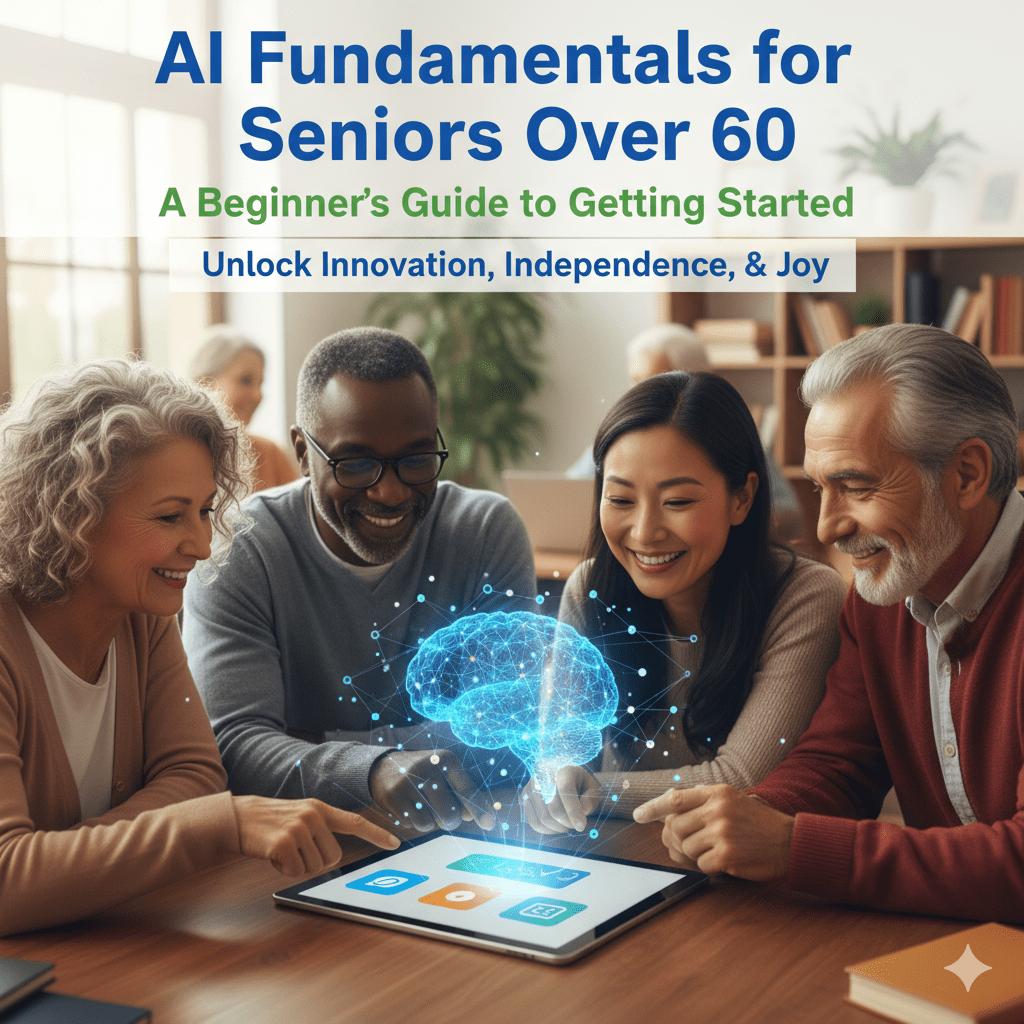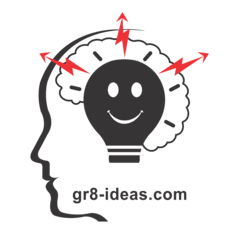
AI Fundamentals for Seniors Over 60
In an era where technology evolves rapidly, artificial intelligence (AI) stands out as a transformative force that’s accessible to everyone, including those over 60. If you’re a senior wondering about AI fundamentals and how to dive in without feeling overwhelmed, you’re in the right place. This comprehensive guide de-mystifies AI basics, highlights its benefits for older adults, and provides step-by-step advice on getting started. Whether you’re retired and curious about new hobbies or seeking ways to stay connected and independent, learning AI can enhance your daily life. With free resources tailored for beginners, AI isn’t just for tech-savvy youth—it’s a tool for empowerment at any age.
What Is Artificial Intelligence?
At its core, ‘Artificial Intelligence’ refers to machines designed to perform tasks that typically require human intelligence, such as recognizing speech, making decisions, or learning from data. Think of AI as a smart assistant that mimics human thinking but processes information much faster. Although research on AI began in the 1950s with basic programs, it is only recently that it has exploded and spread worldwide in quick time, thanks to transformative advancements in computing power and data availability.
Simply put, AI is the ability of machines to ‘think/analyse/respond/act/behave’ somewhat like humans; the endeavour being to empower machines to replicate human functions as perfectly as possible, with one exception – to do what humans do in hours, minutes or tens of seconds, in milli and micro seconds. In general, the closer a machine behaves to the real human the higher it ranks on the AI index. Key concepts in AI fundamentals include:
- Machine Learning (ML): Where systems improve from experience without explicit programming.
- Neural Networks: Inspired by the human brain to recognize patterns.
- Natural Language Processing (NLP): Which enables chatbots to understand and respond to human language.
For seniors over 60, grasping these doesn’t require a degree—just curiosity. Imagine AI as a recipe: Data is the ingredient, algorithms are the instructions, and the output is the delicious result, like personalized recommendations on Netflix.
AI comes in types: Narrow AI handles specific tasks (e.g., voice assistants like Siri), while General AI, which thinks like humans across domains, is still emerging. Ethical considerations are crucial too—Responsible AI ensures fairness, privacy, and transparency, preventing biases that could affect older users in healthcare or finance. By starting with these basics, seniors can appreciate how AI integrates into everyday tools, from smart home devices to health apps, making life simpler and more engaging.
Why Learn AI?
Learning AI offers profound advantages for older adults, far beyond mere novelty. It promotes cognitive health by challenging the brain through problem-solving and new skills, potentially reducing the risk of age-related decline. For instance, AI-powered apps can assist with memory games or learning new languages, keeping minds sharp.
On a practical level, AI enhances independence. Voice-activated devices like Amazon Echo help with reminders for medications, appointments, or even turning off lights, reducing fall risks and supporting aging in place. Socially, AI combats isolation as virtual companions provide conversation, while AI-driven video calls with facial recognition make connecting with family effortless.
Health benefits are significant: AI tools monitor vital signs via wearables, predict health issues early, and offer personalized fitness plans. For retirees, AI opens doors to hobbies like genealogy research or creative writing, where tools generate ideas or organize data.
Economically, understanding AI prepares seniors for a world where it’s integral to services like banking or shopping, preventing scams through AI detection features.
Moreover, classes on AI foster community, as seen in programs where seniors learn together, building confidence and reducing tech anxiety. Overall, embracing AI fundamentals empowers those over 60 to live more vibrantly, safely, and connectedly, turning potential challenges into opportunities for growth. Lastly, it helps them in narrowing the generation-gap or the technology-gap.
How to Get Started with AI?
Getting started with AI as a senior doesn’t require fancy equipment: just a smartphone, tablet, or computer, an open mind and zest to learn. Begin by assessing your comfort level: if tech feels intimidating, start with simple interactions like asking your phone’s voice assistant questions.
Step 1: Build Foundational Knowledge
Watch short videos or read beginner articles explaining AI basics. For example, explore free modules on platforms that break down concepts without jargon.
Step 2: Enroll in Tailored Courses
Organizations like ‘Senior Planet’ from AARP offer free online classes specifically for older adults, covering AI in daily life and how to spot it. Other options include Google’s AI Essentials, which provide practical skills through interactive lessons.
Step 3: Practice Hands-On
Experiment with free tools—type queries into chatbots to see AI in action. Join community groups or online forums where seniors share experiences.
Step 4: Set Small Goals
Dedicate 15-30 minutes daily to learning, like using AI for recipe suggestions or weather predictions. Track progress in a journal to build confidence.
Step 5: Seek Support
Many libraries offer AI workshops for seniors, or pair with a younger family member for guided sessions. Remember, it’s okay to go slow—consistency trumps speed.
By following these steps, seniors over 60 can transition from novices to confident users, unlocking AI’s potential in their routines.
Best AI Tools and Apps for Seniors Starting Out
For beginners over 60, user-friendly AI tools make learning enjoyable. Start with:
- ChatGPT: A free chatbot accessible via web or app, where you can ask anything from history facts to travel tips. It’s intuitive: Just type or speak, and it responds conversationally.
- Google Gemini: Offers similar features but integrates with Google services, ideal for searching photos or emails intelligently.
- Microsoft Copilot: Built into Windows, assists with tasks like writing emails or organizing files.
For health:
- MyFitnessPal: Uses AI to track nutrition tailored to seniors’ needs, suggesting meals based on dietary restrictions.
- ElliQ: Provides emotional support through chats and reminders, designed specifically for older adults to reduce loneliness.
Creative tools:
- Canva’s AI Features: Help design cards or albums effortlessly.
For safety:
- Nest Cameras: AI-powered home devices detect unusual activity and alert family.
Free options abound: Google’s free AI tools for translation or speech-to-text are perfect for multilingual families. Always prioritize privacy—choose apps with clear data policies. These tools turn AI fundamentals into practical magic, enhancing independence for seniors.
Tips for Success
For those over 60, learning AI comes with small hurdles, like tech familiarity or physical limitations, but these should be seen merely for what they are; minor challenges to be happily overcome with persistence. Here are some tips to ensure success:
- Embrace a Growth Mindset: View mistakes as learning opportunities, not failures.
- Adapt to Your Pace: Use larger fonts, voice commands, or simplified interfaces. If eyesight is an issue, opt for audio-based resources like podcasts on AI basics.
- Stay Safe Online: Learn to identify AI-generated scams by checking sources and using tools that flag deepfakes.
- Community Support is Key: Join senior-focused AI groups on platforms like Facebook or AARP forums.
- Incorporate Fun: Use AI for hobbies, like generating art with DALL-E or music playlists.
- Balance Screen Time: With breaks to avoid fatigue.
- Measure Progress: After a month, note how AI has simplified tasks, like automated shopping lists. If stuck, free helplines from tech companies can assist.
Ultimately, these strategies make “AI for seniors over 60” not just educational but enjoyable, fostering lifelong learning.
Embrace AI for a Brighter Future
AI fundamentals offer seniors over 60 a gateway to innovation, independence, and joy. From understanding basics like machine learning to using tools for daily ease, getting started is simpler than ever with free courses and apps. By integrating AI into your life, you’ll not only keep up with the world but thrive in it, shaving years off yourself. Happy Learning!
By Dr. Amardeep Bhardwaj
